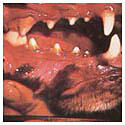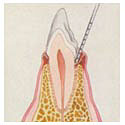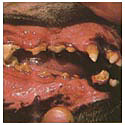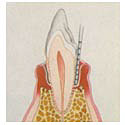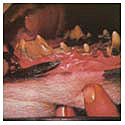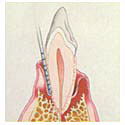Friendship Springs Veterinary Care
(770)967-8387
www.friendshipspringsvet.com
|
Why Dentistry For Pets
It's not just about a pretty smile. In addition to bad breath and being unsightly, dental disease is a source of infection, pain, and even death. It has been documented to cause cardiac disease, pneumonia, tracheobronchitis, kidney failure, splenic and liver abscesses, and it can even lead to cancers of the mouth. Most people have heard of gingivitis and periodontitis, but they often don't really understand what these words mean. Simply put, gingivitis means infection of the gums (gingiva) and periodontitis means infection of the gums that is so bad its causing infection of the deep soft tissues and bone around the teeth.
Preventing and treating these two diseases is as at least as important a part of keeping pets healthy as any vaccine, test, or medication, and the earlier the better. Generally, gingivitis is reversible. However, once periodontitis sets in, the changes become irreversible. Sometimes, if the changes are mild, continued good care can prevent progression. However, if the damage is severe, extraction of the tooth may become necessary. This is because once a certain amount of damage has been done, no matter how often the bad tooth is cleaned, the disease resumes again almost immediately.
Gingivitis – Dental Disease Grade 1 and 2
These mouths will have some plaque formation on the teeth and perhaps some mild staining. There may be some minimal to very early gingivitis, usually seen as a faint red line along the margin. When gingivitis is noted, the gum line has clearly become infected. As the disease progresses, increased mouth odor will be noted with brownish deposits, visible calculus (tartar) developing on the teeth, and the margin of redness along the gum line becomes more noticeable. As the tartar begins to extend underneath the gum line and into the gingival sulcus (see photo above), bacteria to invade and erode the periodontal ligament which is the fibrous tissue that holds the tooth in place. This is an important problem because its just a short matter of time before the damage becomes irreversible. If we intervene now, we can get the mouth healthy again and work to keep it that way with some relatively simple things without a great deal of trouble or expense..
At this stage a routine professional prophylaxis will be recommended. Basically, a prophylaxis means dental exploration, evaluation, scaling, cleaning, and polishing. This is basically what happens for humans when we go to the dentist. During this process the plaque and tartar build-up will be removed from the teeth, both above and below the gum line with handheld and ultrasonic scalers. The teeth are then polished to remove microscopic scratches that predispose to plaque formation and calculus build-up. Each tooth and the entire oral cavity are checked for any disease.
Grade 1
Grade 2
Gingivitis – Dental Disease Grade 3 and 4
There is extensive calculus build-up above and below the gingiva. The red along the gingiva present in the milder grades will have progressed to involving much more extensive areas of the gum, the calculus deposits will be much more severe, pus may be present along the gum line (pyorrhea), obvious recession of the gingiva from the neck of the teeth may be evident, and as the disease worsens, increased mobility (looseness) of teeth may be noted. Some teeth may be salvageable still but some will be too far gone to save and will require extraction.
The mouth may be returned to manageable condition but not without effort. At this level a routine dental prophylaxis will not address this disease completely, but it is a good place to start on the way to getting the mouth healthy enough to do any necessary oral surgery. We would like to get the mouth cleaned up and at least to a non-infected point. If the disease is bad enough we may use antibiotics before and/or after the procedures. If there are teeth loose enough to be removed without oral surgery, this will be done at the same time.
On the other hand if teeth in need of extraction require oral surgery, then we will not usually do this at the same time. There are a few reasons for this. (1) Surgery in an inflamed mouth will result in greater pain post-operatively. (2) Surgery in an inflamed mouth is more complicated. (3) Complications result in longer anesthesia times. (4) Even if the surgery didn't take longer because of complications, the combined cleaning and oral surgery would significantly increase anesthesia time. We find that complications are fewer with shorter anesthesia periods even if it means more than one anesthesia episode as opposed to one really longer anesthesia period which increases the risk time for complications. So, we will get the mouth cleaned up and healthy and then address the extractions when it can be done in a less complicated manner. . Even if some or even all teeth may lost or need extraction, these pets can go on to live happy, healthy lives with a comfortable, clean, and pain-free mouth. When the mouth is healthy again we can work on keeping it that way.
Grade 3
Grade 4
|




